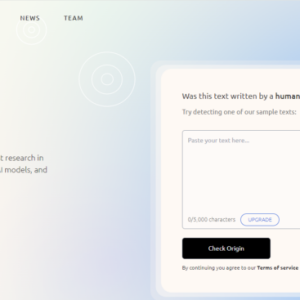Artificial intelligence (AI) has revolutionized the field of marketing content, offering businesses unprecedented opportunities to understand and engage with their target audience. However, as AI continues to advance, it also presents several significant challenges and concerns. In this rapidly evolving landscape, it is crucial to address the biggest issues associated with AI in marketing content to ensure ethical and responsible use of this technology. From potential biases and data privacy concerns to the threat of job displacement, understanding and proactively addressing these issues is essential for marketers and businesses to navigate the AI-driven marketing era successfully.
- From Podcasts to Blogs: The Best AI Tools for Podcasters
- 6 AI Joke Generator Options: Can Artificial Intelligence Make You Laugh?
- 10 Mouthwatering AI Recipe Generator Tools for Creative Meal Planning & More
- Notion AI Review: Your New Secret Productivity Hack?
- Krisp Review: Best Noise Cancelling App for Your Needs?
AI tools have made significant strides in various industries, especially content generation. However, amidst its progress, there are underlying issues with artificial intelligence that need to be addressed.
You are viewing: The Biggest Issues with Artificial Intelligence in Marketing Content
In this blog post, we will take a look at the biggest problem with AI content and explore the concerns, risks and ethical considerations surrounding its implementation.
The Pitfall: Duplicate and Plagiarized Content
Upon conducting extensive testing of numerous AI content generation tools, the team over at NP Digital delved into the intricacies of this technology to gain a deeper understanding of its capabilities and limitations.
They subjected each AI tool to thorough testing, running 40-50 tests per tool. Shockingly (or maybe not, if you know how this technology works), their findings revealed that:
Nearly 40% of the content generated by these AI tools consisted of plagiarized sentences.
The implications of this revelation were significant and underscored the pressing need to address the issue of duplicate and plagiarized content within the realm of AI content generation.
Despite all this, however, we realize that AI capability is only getting better, not worse, so the efficacy on AI content is only ripe to improve.
However, AI content still relies on human-made material to source its information, making it crucial that you weave human agency into any content you derive from AI. The biggest challenge for AI-powered writing tools is originality and creativity:

Thankfully, there are handy tools out there that can help you measure the authenticity and originality of your content. Here are a few of our favorites:
- GPT-2 Output Detector Demo (AI detector)
- Content at Scale Detector (AI detector)
- GPT Zero (AI detector)
- Copyleaks (AI and plagiarism detector)
- Writer’s AI Content Detection (AI detector)
- Copyscape (plagiarism detector)
- Duplichecker (plagiarism detector)
Related Content: AI in Business: How We Use Artificial Intelligence at Our Agencies
The Downfall of Specificity
When we focused on generating content with specific details, industry-specific terminology and tailored insights, we noticed a parallel increase in the occurrence of duplicate and plagiarized sentences.
The algorithms powering AI tools struggled to generate original content that matched the level of specificity demanded.
This limitation poses a significant challenge for businesses and content creators who rely on AI-generated content to cater to niche audiences or address specialized topics.
Conversely, when we shifted our focus towards more generic topics, such as broad industry trends or general tips and advice, the occurrence of duplicate or plagiarized content diminished noticeably.
See more : Article Forge Review – Is This AI Writing Tool Worth The Money?
The AI tools seemed to fare better in generating content that was less nuanced and demanded less contextual understanding. This observation points to the fact that:
AI algorithms primarily rely on patterns and existing data to generate content.
So what does this mean for complex industries? It means that, for those that rely on tailored and specialized content, such as B2B sectors or niche markets, the limitations of AI content generation tools pose a considerable challenge.
The risk of inadvertently publishing duplicated or plagiarized content can lead to damaged reputations, legal consequences, and a loss of trust from both audiences and search engines.
However, it is important to note that AI content-generation tools should not be disregarded entirely. They still offer significant value in automating certain aspects of content creation, increasing efficiency, and aiding in brainstorming ideas.
Ensuring Authenticity: The Role of Human Input
While AI-generated content undoubtedly has its merits and can aid in various aspects of content creation, it is crucial for businesses and content creators to exercise caution and not solely rely on the output produced by these powerful tools.
The need for human intervention in the content creation process becomes evident when we examine a fascinating Twitter thread that sheds light on the importance of authenticity in the digital landscape.
In the thread, Joe Davies comments on his secret sauce in getting generative AI output to be virtually 99.99% indiscernible by AI detectors. His secret? He simply tells it to act like a human.


It is important to note that this discovery by Joe Davies should not be misconstrued as a means to “game the system” or manipulate search engine rankings. Rather, it serves as a compelling example of how involving human writers in the content creation process can enhance authenticity and resonate more profoundly with audiences.
The integration of human creativity, expertise and understanding of nuanced language allows for the production of content that is not only original but also captivating, informative and engaging.
While AI content generation tools have advanced significantly, they still have their limitations when it comes to infusing content with the subtleties and emotion that is crucial for making something appear authentic. AI algorithms excel at identifying patterns, analyzing data and generating content based on existing information, but they struggle to replicate the depth of human creativity and intuition.
To take it even further, the role of human input in the content creation process goes beyond mere editing or proofreading. It involves injecting unique perspectives and experience, industry insights and the ability to adapt the content to the desired tone, target audience and branding. Human writers have the capacity to infuse content with empathy and a deep understanding of the desired objectives.
AI-generated content can serve as a valuable starting point or inspiration, but it should be treated as a tool to support human creativity and enhance productivity rather than a substitute for genuine human effort.
Related Content: 100+ ChatGPT Prompts to Enhance Your Marketing Campaigns
The Future of AI Content
To navigate this new content landscape successfully, marketers and content creators must strike a delicate balance between harnessing the power of AI assistance and infusing their work with the unparalleled creativity and insights that only humans can provide.
See more : The Future of White-Collar Work in the Age of AI: Your Survival Guide
Embracing the synergy between AI and human creativity is crucial in the pursuit of high-quality content. AI algorithms can aid in automating repetitive tasks, analyzing vast amounts of data, and generating outlines and initial drafts that lay the foundation for further refinement.
However, it is the human creative process that enables the exploration of unique angles, the injection of personal experiences, and the crafting of narratives that truly resonate with readers.
It is crucial to recognize that AI content generation tools do not represent a reincarnation of the old “article spinning” approach that was prevalent in the past:

The future of AI-driven content will probably look something like this:
- Collaborative Content Creation: AI will be used more widely as a tool to aid human content creators, providing suggestions, automating parts of the creative process, or even co-creating content alongside humans.
- Improved AI Creativity: Advances in AI (not in the near future, but further down the line) could lead to more creative content in the form of text, audio and visuals. AI might be able to write convincing novels, compose music or create artwork, potentially blurring the lines between human and AI creativity.
- Real-Time Content Modification: AI could be used to dynamically alter digital content in real-time based on user interactions, contextual factors or live data feeds.
- Deepfakes and Synthetic Media: As AI technologies like deep learning improve, we could see a rise in the generation of synthetic media or deepfakes. These technologies could be used positively for entertainment or negatively to spread misinformation, hence there will be a strong need for detection and regulation mechanisms.
- Interactive Entertainment: In gaming and interactive media, AI can create personalized narratives that respond to a player’s actions. The rise of AI Dungeon, a text-based game where the AI creates the story, could be a sign of what’s to come:

- Accessibility: AI could help to improve content accessibility, for instance by automatically generating accurate captions, descriptions and translations, or by adapting content to suit individuals with specific needs.
- Ethics and Regulations: As AI-generated content becomes more common, we can also expect more discussions and regulations around the ethics of AI content creation, including issues of copyright, authenticity, consent, misinformation, and more.
It’s crucial to note that these developments depend on many factors, including technological advancements, ethical considerations and societal acceptance. Some of these possibilities also pose significant challenges and risks, emphasizing the importance of thoughtful design, regulation and use of AI technologies.
For now, human creativity is definitely needed, as it has the power to uncover unique angles and perspectives that AI algorithms simply cannot conceive of, such as storytelling elements, the weaving of narratives, and the infusion of empathy and emotional intelligence into the content.
These aspects contribute to a richer and more engaging reading experience, forging deeper connections between brands and their audience.
Final Thoughts on Issues with Artificial Intelligence
Okay, we might have set you up to think AI is more problematic than not, but the truth is that we do have optimistic hopes for it as a supplemental tool.
Let’s face it. AI isn’t yet at the point of mimicking true human originality, meaning that we still have our part to play in content creation.
AI can be game-changing in the idea creation process, however, and it’s capable of getting you most of the way there regarding quality content. All you have to do is keep a sharp wit and impart your expertise into any artificial content you create.
With that in mind, you will have a responsible and conservative mindset when using AI for content.
If you’re ready to level up your content with AI tools, Single Grain’s AI experts can help!👇
Repurposed from our Marketing School podcast.
That’s a wrap on “The Biggest Issues with Artificial Intelligence in Marketing Content” We hope you’ve found a trove of useful insights and fresh perspectives. Your opinions and ideas matter to us—join the conversation below and share your take! Hungry for more tech insights? Dive into our diverse collection of articles where innovation meets practicality. Discover More AI Softwares.
Stay in the loop with the latest in AI and tech – your journey into the digital future continues at duanetoops.com.
#Biggest #Issues #Artificial #Intelligence #Marketing #Content
Source: https://duanetoops.com
Category: AI





